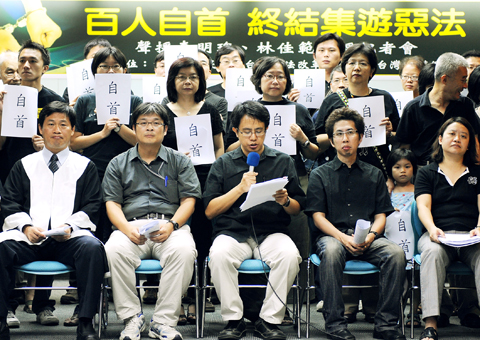More than 120 academics and human rights activists said yesterday they would turn themselves in to prosecutors for breaking the Assembly and Parade Act (集會遊行法) in a protest against the legislation.
One after another, more than 30 people gave their name and occupation at a press conference in Taipei, telling prosecutors that they had violated the Act and would like to turn themselves in.
They did so in a show of support for National Taiwan University (NTU) sociology professor Lee Ming-tsung (李明璁) and Taiwan Association for Human Rights chairman Lin Chia-fan (林佳範), who have been indicted for contravening the Act in May and last month respectively.

PHOTO: LO PEI-DER, TAIPEI TIMES
Lee was indicted for taking a leading role in a student demonstration outside the Executive Yuan last November that demanded a revision of the Act, while Lin was indicted for organizing a separate demonstration outside the legislature.
“We believe that the right to assemble and parade are fundamental rights protected by the Constitution and that peaceful assembly is not an illegal act,” said NTU law professor Yen Chueh-an (顏厥安), whose name topped the “surrender list.”
“We have all taken to the streets without government permission. Therefore, if Lee and Lin are guilty, we’re equally guilty,” he said.
National Tsing Hua University sociology professor Lii Ding-tzann (李丁讚) said he would also turn himself in, even though he didn’t think he had done anything illegal.
“I want to do so because the Assembly and Parade Act is unconstitutional and I want to debate it with a judge and a prosecutor in court,” he said.
He also accused the judiciary of becoming a tool of the executive branch by “threatening people not to speak out and prosecuting people who do.”
More than 50 lawyers joined the campaign by volunteering to provide legal assistance to those on the list.
Meanwhile, the activists and academics also called on the Cabinet and the Chinese Nationalist Party (KMT) to reconsider their version of an amendment to the Act.
Although the Cabinet-proposed revision removes the requirement for organizers to apply for permission before holding a rally, organizers must obtain authorization from the owner of the venue beforehand.
“Since most demonstrations are held in public places, organizers would have to get authorization from the government,” said Liu Ching-yi (劉靜怡), a professor at NTU’s Graduate Institute of National Development.
“So how is that different from applying for a permit?” Liu said.
Liu said she also did not agree with the amendment granting police the power to maintain order and disband demonstrations.
“It makes police both player and referee,” she said.

AGING: As of last month, people aged 65 or older accounted for 20.06 percent of the total population and the number of couples who got married fell by 18,685 from 2024 Taiwan has surpassed South Korea as the country least willing to have children, with an annual crude birthrate of 4.62 per 1,000 people, Ministry of the Interior data showed yesterday. The nation was previously ranked the second-lowest country in terms of total fertility rate, or the average number of children a woman has in her lifetime. However, South Korea’s fertility rate began to recover from 2023, with total fertility rate rising from 0.72 and estimated to reach 0.82 to 0.85 by last year, and the crude birthrate projected at 6.7 per 1,000 people. Japan’s crude birthrate was projected to fall below six,

Conflict with Taiwan could leave China with “massive economic disruption, catastrophic military losses, significant social unrest, and devastating sanctions,” a US think tank said in a report released on Monday. The German Marshall Fund released a report titled If China Attacks Taiwan: The Consequences for China of “Minor Conflict” and “Major War” Scenarios. The report details the “massive” economic, military, social and international costs to China in the event of a minor conflict or major war with Taiwan, estimating that the Chinese People’s Liberation Army (PLA) could sustain losses of more than half of its active-duty ground forces, including 100,000 troops. Understanding Chinese

US President Donald Trump in an interview with the New York Times published on Thursday said that “it’s up to” Chinese President Xi Jinping (習近平) what China does on Taiwan, but that he would be “very unhappy” with a change in the “status quo.” “He [Xi] considers it to be a part of China, and that’s up to him what he’s going to be doing, but I’ve expressed to him that I would be very unhappy if he did that, and I don’t think he’ll do that. I hope he doesn’t do that,” Trump said. Trump made the comments in the context

SELF-DEFENSE: Tokyo has accelerated its spending goal and its defense minister said the nation needs to discuss whether it should develop nuclear-powered submarines China is ramping up objections to what it sees as Japan’s desire to acquire nuclear weapons, despite Tokyo’s longstanding renunciation of such arms, deepening another fissure in the two neighbors’ increasingly tense ties. In what appears to be a concerted effort, China’s foreign and defense ministries issued statements on Thursday condemning alleged remilitarism efforts by Tokyo. The remarks came as two of the country’s top think tanks jointly issued a 29-page report framing actions by “right-wing forces” in Japan as posing a “serious threat” to world peace. While that report did not define “right-wing forces,” the Chinese Ministry of Foreign Affairs was